| # NAME | Protein per 100g | Cost per kg | Protein |
|---|---|---|---|
| 83g | $33 | 25g | |
| 85g | $26 | 34g | |
| 80g | $33 | 24g | |
| 86g | $7 | 26g | |
| 77g | $38 | 23g | |
| 80g | $35 | 24g | |
| 76g | $36 | 23g | |
| 50g | $60 | 15g | |
| 71g | $51 | 28g | |
| 89g | $52 | 22g |
Whey protein has traditionally been the go-to choice, but with growing environmental and health awareness, plant-based protein powders are gaining traction.
Whether it’s concerns about dairy farming or the added nutrients in plant-based proteins, it’s worth considering incorporating these powders into your daily supplement routine.
Here’s our pick of the best plant-based protein powders in Australia right now.
Best Plant-Based Protein Powders in Australia 🌱
Bulk Nutrients Soy Protein Isolate
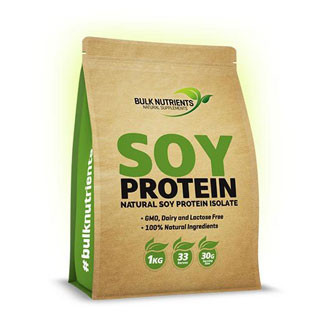
Protein per 100g: 83g
Cost per kg: $33
Serving size: 30g
Protein: 25g
Bulk Nutrients’ soy protein isolate is GMO-free, making it a safe choice for those concerned about soy allergies. It’s a complete protein, gentle on the stomach, and comes in two tasty flavours plus a raw option. It’s an excellent, budget-friendly choice for a daily protein boost and a perfect introduction to plant-based proteins for newcomers.
UProtein Soy Protein Isolate
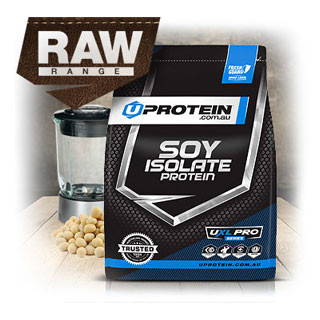
Protein per 100g: 85g
Cost per kg: $26
Serving size: 40g
Protein: 34g
UProtein’s soy protein is GMO-free and Australian-made, ensuring quality. While they don’t offer bulk purchases and are priced higher than some competitors, they remain affordable. This vegan-friendly option boasts low carbs and fats, with no sugars or artificial sweeteners. Plus, their 100% satisfaction guarantee reflects their confidence in the product as a solid choice to consider.
Bulk Nutrients Organic Brown Rice Protein
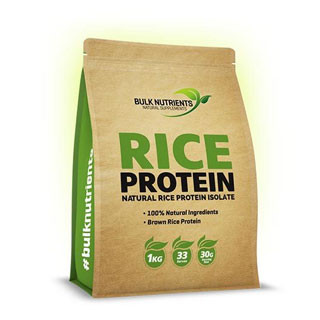
Protein per 100g: 80g
Cost per kg: $33
Serving size: 30g
Protein: 24g
Brown rice protein is one of the best proteins for allergy sufferers as it is very easy on your stomach, however its big downfall is often said to be the taste as it can often be a bit gritty. Bulk Nutrients aims to alleviate this with several great tasting flavours and a highly refined powder process. Once again Bulk Nutrients comes in at the lowest price point and with their consistent quality.
Honest to Goodness Organic Sprouted Brown Rice Protein
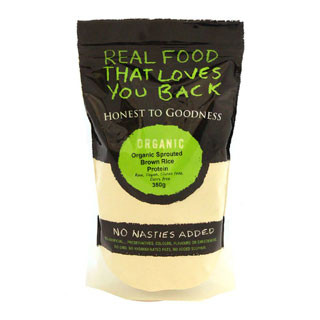
Protein per 100g: 86g
Cost per kg: $7
Serving size: 30g
Protein: 26g
Honest to Goodness is producing a non-GMO brown rice protein that you can buy in really large quantities, which is great for those of us needing a few daily shakes. Something to keep in mind is that this product is from China and brown rice has been known to contain levels of arsenic and there was no information available for allergen advice for this product. This would be my second favourite choice for brown rice proteins.
Bulk Nutrients Earth Protein
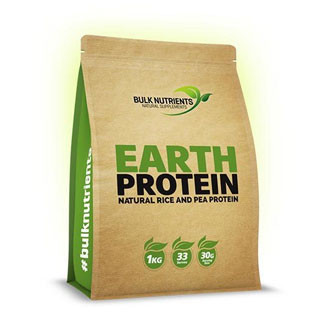
Protein per 100g: 77g
Cost per kg: $38
Serving size: 30g
Protein: 23g
Earth Protein combines brown rice and pea protein, enhancing the nutrient profile and smoothing the texture. It’s an affordable, GMO-free option from Bulk Nutrients that offers a two-in-one protein mix. This plant-based powder is a solid contender to replace whey shakes.
Bulk Powders Organic Pea Protein
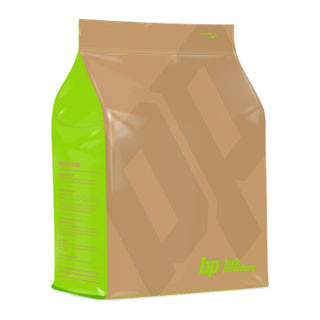
Protein per 100g: 80g
Cost per kg: $35
Serving size: 30g
Protein: 24g
Bulk Powders is coming up with a great pea protein option here, they are low on cost and aim to maintain a high level of quality. Pea protein is another great protein for those who have any allergies, so making the switch from whey or soy to pea protein is a really sensible choice. If you want to try a 100% pea protein, this would be our pick.
VPA Australia Pea Protein Isolate
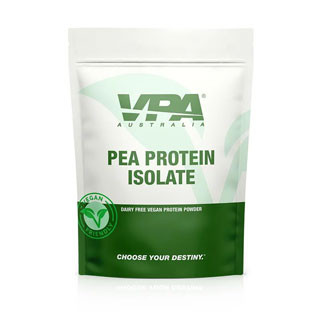
Protein per 100g: 76g
Cost per kg: $36
Serving size: 30g
Protein: 23g
VPA Australia provides a selection of vegan-friendly proteins, with their pea protein being a standout for its allergy-friendly profile and smooth mixability. Ideal for athletes, it’s WADA approved and undergoes strict testing. Whether for smoothies or juices, it’s a great protein boost. Even if pea protein isn’t your go-to, VPA’s diverse plant-based range is worth exploring.
Hemp Foods Australia Organic Hemp Protein
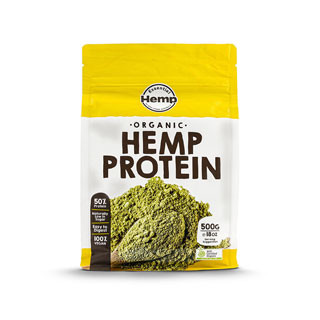
Protein per 100g: 50g
Cost per kg: $60
Serving size: 30g
Protein: 15g
Hemp protein is quickly gaining popularity. Although costlier and lower in protein content compared to others, its benefits make it a valuable addition to your diet. It’s ideal for smoothies and recipes, providing cardiovascular and immune system advantages, and is a complete protein with all essential amino acids. It’s especially recommended for athletes and regular gym-goers to incorporate into their routine as an occasional supplement.
VPA Australia Premium Plant Vegan Protein
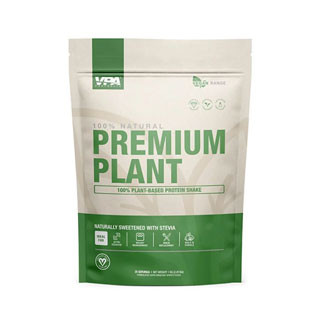
Protein per 100g: 71g
Cost per kg: $51
Serving size: 40g
Protein: 28g
VPA’s premium blend is designed to meet all protein and nutrient needs, especially for vegans. Combining Pea Protein Isolate, Rice Protein, Pumpkin Seed Protein, and Sacha Inchi Protein, it ensures a high protein and nutrient profile. It’s an excellent choice for those transitioning to a vegan diet or seeking a high-quality supplement alternative. Highly recommended for its comprehensive benefits.
Bulk Nutrients Future Whey
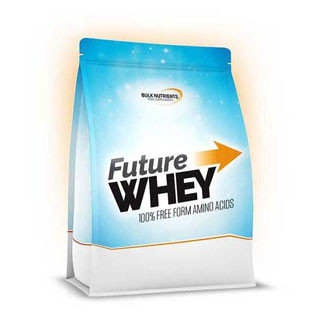
Protein per 100g: 89g
Cost per kg: $52
Serving size: 25g
Protein: 22g
Despite the name, Bulk Nutrients’ Future Whey is a plant-based protein free from whey and animal products. This unique blend aims to outperform traditional whey, offering a non-milky taste ideal for long workouts. While slightly pricey, it’s a good investment as it eliminates the need for separate BCAAs. Its high quality makes it a recommended choice, and its popularity could lead to more mainstream appeal.
You’ll also like:
Choosing organic, non-GMO powders with a simple ingredient list is often a good way to ensure you’re getting a healthy product.
Different Types of Plant-Based Protein 🫛🥜
- Pea Protein: Made from the yellow split pea, a high-fibre legume that boasts all but one of the essential amino acids.
- Brown Rice Protein: A good protein source for people with allergies or sensitivities, offering a hypoallergenic option.
- Hemp Protein: Derived from the seeds of the hemp plant, this protein is rich in omega-3 fatty acids and fibre.
- Soy Protein: One of the few complete plant proteins, containing all essential amino acids, often used in meat substitutes.
- Pumpkin Seed Protein: Along with its protein content, it’s also rich in magnesium, zinc, iron, and other minerals.
- Sunflower Seed Protein: A newer entrant to the market, offering a nutty taste and a good source of vitamins E and B.
- Chia Protein: Not only high in protein but also omega-3 fatty acids, fibre, antioxidants, and calcium.
- Quinoa Protein: Sourced from the quinoa grain, it is complete with all nine essential amino acids and is also gluten-free.
What Is The Highest Quality Plant Protein? 👍🏻
When it comes to plant protein, the term ‘highest quality’ often refers to its amino acid profile and digestibility. A complete protein — one that contains all nine essential amino acids — is considered high quality.
In the plant kingdom, soy protein often takes the crown for its completeness and close resemblance to animal protein in terms of amino acid content.
However, pea protein is also a formidable contender, boasting a robust amino acid profile and good digestibility.
Look for powders that combine different plant proteins, such as pea and rice or hemp and chia, to ensure you’re getting a comprehensive array of amino acids.
What Type Of Plant-Based Protein Powder Is Best? 🏆
The ‘best’ type of plant-based protein powder can vary depending on individual dietary needs and preferences. For instance, pea protein is rich in iron and may be easier on the stomach for some.
Brown rice protein is hypoallergenic and is a good choice for those with sensitivities.
Hemp protein, meanwhile, is not only complete in terms of amino acids but also offers the added benefits of omega-3 fatty acids and fiber.
Ultimately, the best protein is one that aligns with your health goals, dietary restrictions, and taste preferences. Many people opt for blends that combine the nutritional benefits of multiple plant sources.
Is Plant-Based Protein Powder Worth It? 🤔
Absolutely, for many individuals, plant-based protein powders are a valuable addition to their diet. They are particularly beneficial for vegetarians, vegans, or those with dairy intolerances, providing an essential source of protein that might be harder to obtain from whole foods alone.
Plus, plant based protein powders often come packed with additional nutrients like fibre, vitamins, and minerals, which can contribute to a balanced diet.
They’re also a convenient and quick source of protein for people with busy lifestyles. The environmental benefits, such as a lower carbon footprint compared to animal-based proteins, can also make them a more sustainable choice worth considering.
Is Plant-Based Protein Actually Healthy? 🍎
Yes, for many reasons! They typically contain less saturated fat and more fibre than their animal protein counterparts, which is beneficial for heart health and digestion.
Additionally, they are rich in phytonutrients and antioxidants, which are compounds that can help reduce inflammation and combat oxidative stress.
However, as with any food product, it’s important to check the labels for added sugars, fillers, and artificial additives that could undermine the health benefits.
Choosing organic, non-GMO powders with a simple ingredient list is often a good way to ensure you’re getting a healthy product.
Plant Based Protein Powder FAQs
Is plant or whey protein better?
What are the downsides to plant protein powder?
Some plant protein powders may have a grittier texture and a less smooth taste compared to whey. They can also be less complete in terms of essential amino acids unless they’re a blend of different plant sources.
Will I lose weight if I drink 3 protein shakes a day?
Not necessarily. Weight loss is about the overall balance of calories consumed versus calories burned. Protein shakes can help with satiety, which might aid in reducing overall calorie intake, but they’re not a magic bullet for weight loss.
Are all plant-based protein powders vegan friendly?
Most are, but it’s important to read the label. Some may contain non-vegan additives or be processed in facilities that handle dairy or other animal products.
The Best Plant Based Protein Powder? 🥇
Bulk Nutrients stands out in this list, offering a variety of well-priced options, often being the most affordable.
My top pick is their Earth Protein, a pea and brown rice combo that’s nutrient-rich and wallet-friendly.
While there are other worthy mentions like VPA Australia, some may find them slightly pricier.
If I’ve missed your favourite, feel free to suggest it in the comments for my next trial.












